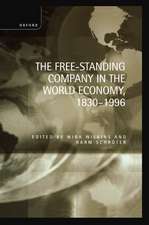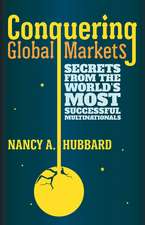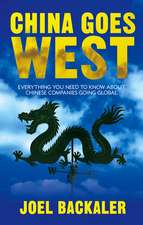The European Corporation: Strategy, Structure, and Social Science
Autor Richard Whittington, Michael Mayeren Limba Engleză Hardback – 23 noi 2000
| Toate formatele și edițiile | Preț | Express |
|---|---|---|
| Paperback (1) | 316.33 lei 31-37 zile | |
| OUP OXFORD – 9 mai 2002 | 316.33 lei 31-37 zile | |
| Hardback (1) | 396.18 lei 31-37 zile | |
| OUP OXFORD – 23 noi 2000 | 396.18 lei 31-37 zile |
Preț: 396.18 lei
Preț vechi: 574.94 lei
-31% Nou
Puncte Express: 594
Preț estimativ în valută:
75.81€ • 82.60$ • 63.88£
75.81€ • 82.60$ • 63.88£
Carte tipărită la comandă
Livrare economică 12-18 aprilie
Preluare comenzi: 021 569.72.76
Specificații
ISBN-13: 9780199242085
ISBN-10: 0199242089
Pagini: 286
Ilustrații: black and white figures, tables
Dimensiuni: 163 x 242 x 21 mm
Greutate: 0.56 kg
Ediția:New.
Editura: OUP OXFORD
Colecția OUP Oxford
Locul publicării:Oxford, United Kingdom
ISBN-10: 0199242089
Pagini: 286
Ilustrații: black and white figures, tables
Dimensiuni: 163 x 242 x 21 mm
Greutate: 0.56 kg
Ediția:New.
Editura: OUP OXFORD
Colecția OUP Oxford
Locul publicării:Oxford, United Kingdom
Recenzii
... very interesting book ... a convincing study ... This study is a good and balanced example of formulating a bounded science of this type and of performing research in such a context.
Almost 40 years after the publication of the seminal Strategy and Structure; Chapters in the History of the Industrial Enterprise, by Alfred D. Chandler, Jr., its rightful European heir has finally arrived.
This book asks big questions, is written in a vivid and engaging style, provides an unusual historical perspective and is certain to provoke debate about challenges of social science and the future of the large corporations that dominate research in our field.
Whittington and Mayer have a very lucid writing style and their findings are easily summarised ... This is a persuasive vindication of the Harvard model as regards the European experience, which can be recommended to business historians as a coping stone to the house that Chandler built.
This volume which can easily be slipped into a briefcase is to be recommended to the business executive who wants to know "why" as well as "what".
Almost 40 years after the publication of the seminal Strategy and Structure; Chapters in the History of the Industrial Enterprise, by Alfred D. Chandler, Jr., its rightful European heir has finally arrived.
This book asks big questions, is written in a vivid and engaging style, provides an unusual historical perspective and is certain to provoke debate about challenges of social science and the future of the large corporations that dominate research in our field.
Whittington and Mayer have a very lucid writing style and their findings are easily summarised ... This is a persuasive vindication of the Harvard model as regards the European experience, which can be recommended to business historians as a coping stone to the house that Chandler built.
This volume which can easily be slipped into a briefcase is to be recommended to the business executive who wants to know "why" as well as "what".
Notă biografică
Richard Whittington is University Reader in Strategy at the Saïd Business School and Fellow of New College, University of Oxford. He was formerly Lecturer in Organizational Analysis at Imperial College and Reader in Marketing and Strategic Management at the University of Warwick. He is author of 'Corporate Strategies in Recession and Recovery' (Unwin Hyman) and 'What is Strategy-and Does it Matter?' (Routledge), as well as articles in a variety of journals. He is Associate Editor of the British Journal of Management and on the editorial boards of Long Range Planning and Organization Studies.; Michael Mayer is a Lecturer in Strategic and International Management at the University of Glasgow. He has published articles in Organization Studies, the European Management Journal, and Industrial and Corporate Change.















